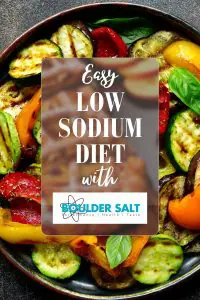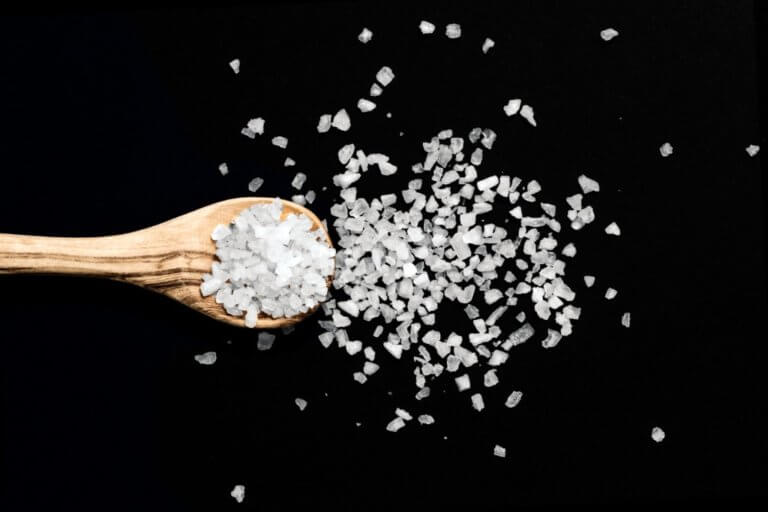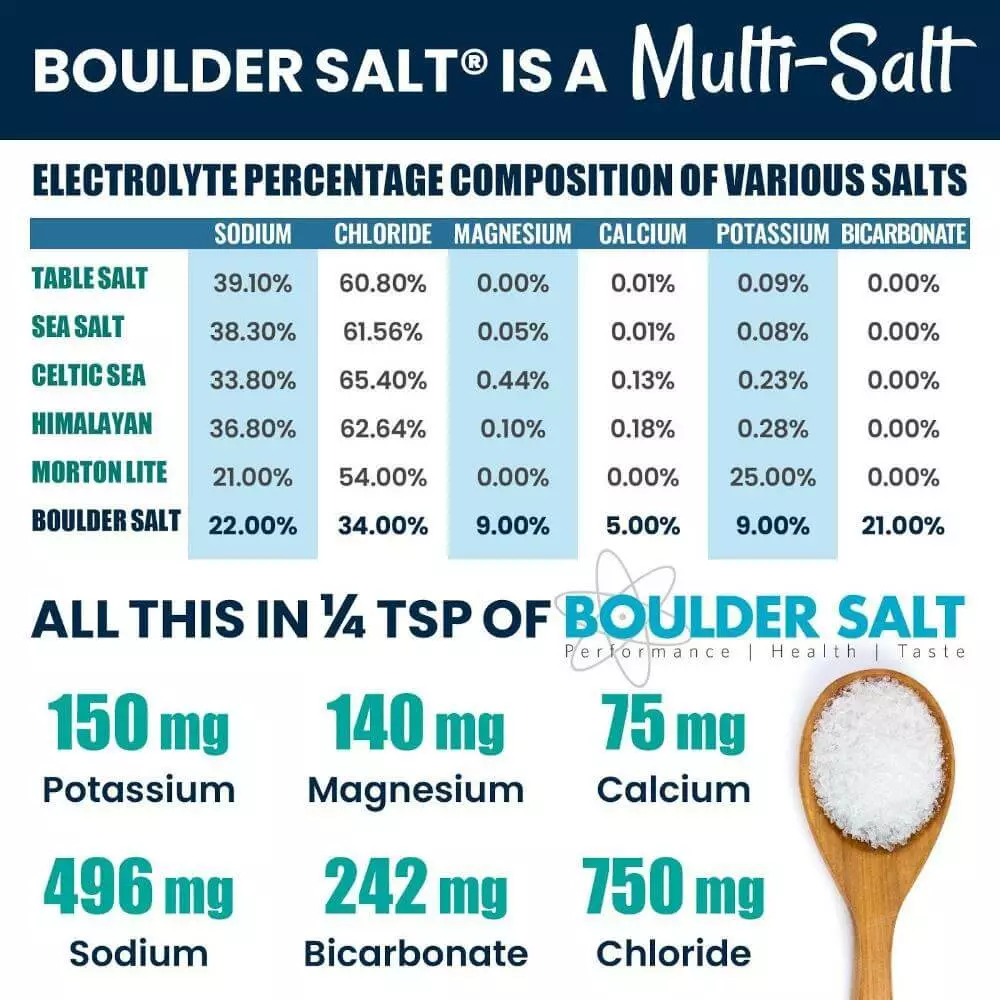
Low Sodium Diet Ideas Any Diet is Low Sodium with Boulder Salt! Are you looking for low sodium diet ideas and recipes

Welcome back to our Boulder Salt “What is the Healthiest Salt?” blog series where we discuss ingredients of popular salts used by consumers, which of those ingredients contribute to health, and what salts are actually a healthy salt or a healthy salt alternative.
In our first installment last week we looked at Himalayan Salt, and today we’ll be considering Sea Salt. However, before we dive into the specifics of Sea Salt, let’s revisit what makes up a healthy salt.
Of the approximately 15 minerals that our bodies require, most of them also function as electrolytes. Those minerals that function as electrolytes include sodium, calcium, potassium, magnesium, bicarbonate, and chloride. The balance of these electrolytes in our bodies is very important. So contrary to the dogma that the best salt is low-sodium, a healthy salt is a balanced blend of the key electrolytes, contains those electrolytes in ratios that our bodies need, is contaminant-free, and tastes good.
We can best answer this question by looking at how Sea Salt is made and what ingredients it contains. Sea Salt is made by evaporating seawater and gathering the sea salt that is left behind. Like table salt, it’s mostly made up of sodium chloride, but depending on what part of the ocean it comes from it can also contain trace minerals, such as iron, zinc, and potassium.
Unfortunately, evaporation also concentrates some of the contaminants commonly found in the ocean. Heavy metals, such as lead, can be found in Sea Salt. Sometimes it also contains microplastics, tiny particles of the many pieces of plastic waste that litter our oceans.
No, and here’s why. Katherine Zeratsky, who is a Registered and Licensed Dietitian at the Mayo Clinic says,
“Sea salt and table salt have the same basic nutritional value, despite the fact that sea salt is often promoted as being healthier. Sea salt and table salt contain comparable amounts of sodium by weight.”
The graph below confirms exactly what Zeratsky is saying. Sea Salt and table salt are nearly identical in sodium content and sea salt has a touch more potassium, magnesium, and calcium, but those differences vary based on where it’s made. Regardless, these mineral levels are not high enough to justify calling it a “healthy salt alternative.”
| Sodium | Chloride | Magnesium | Calcium | Potassium | Bicarbonate | |
| Table Salt | 39.10% | 60.80% | 0.00% | 0.01% | 0.09% | 0.00% |
| Sea Salt | 38.30% | 61.56% | 0.05% | 0.01% | 0.08% | 0.00% |
| Boulder Salt | 22.00% | 34.00% | 9.00% | 5.00% | 9.00% | 21.00% |
Let’s just come right out and say it: Boulder Salt is the healthiest salt compared to table salt and sea salt. The chart above should make it clear that Boulder Salt not only has less sodium and chloride (though still plenty to replenish your electrolytes) but it also has all four of the other minerals–which are essential electrolytes (magnesium, calcium, potassium, and bicarbonate.) All the way around, Boulder Salt is a superior salt.
How bad is sea salt for you? Well, it’s not that it’s toxic, but if you look at the data presented above you will see that sea salt is almost identical chemically to table salt–and table salt isn’t great. Both sea salt and table salt have nearly twice the sodium that Boulder Salt has, and they lack all of the other important nutrients that Boulder Salt offers. So if you’re looking for a healthier salt because your physician has told you to limit your sodium intake, you are simply not going to find your solution in sea salt. It’s as simple as that.
Sea salt does indeed contain more trace minerals than table salt, but only traces. You would have to eat massive amounts of sea salt to get the benefit of these trace minerals (and that would be overloading on sodium and chloride).
One difference, which is subjective, is that many cooks say that they need to use a smaller amount of sea salt to season their food than they would have done with table salt. But, flavor is a hard thing to measure, and no studies have been done to prove if this is true.
That said, there are places where sea salt is very good for you–they’re just not in your food. Sea salt baths have been shown by the National Eczema Foundation to relieve red and itchy skin. In fact, bathing in salty water is something that has been done (and is still done) for thousands of years. One of the most popular activities at the Dead Sea is to bathe in the extremely salty water.
But as an additive to your food? No benefits.
Studies show that high sodium levels are linked to high blood pressure, and high potassium levels are linked to lower blood pressure. Again, referencing the chart above, it’s not hard to see which type of salt is delivering the most in terms of low sodium and high potassium: Boulder Salt. So, Boulder Salt is better for high blood pressure too.
Next week we’ll be looking into a specific brand of this kind of salt, Celtic Sea Salt.
If you’d like to be notified when the next blog in the series is ready, subscribe by filling out the “Contact Us” form below.
And if you have any questions, contact the salt experts at Boulder Salt today!

More to explore

Low Sodium Diet Ideas Any Diet is Low Sodium with Boulder Salt! Are you looking for low sodium diet ideas and recipes

Mountain View Welding does excellent work!
We make the highest recommendation for Loren Tonsing and the staff at https://mountainviewwelding.com Mountain View Welding does excellent work! Excellent communication to

Boulder Salt is in stock at The Raw Store!
Where in the world is Boulder Salt? This time the news is that Boulder Salt is stocked at The Raw Store in